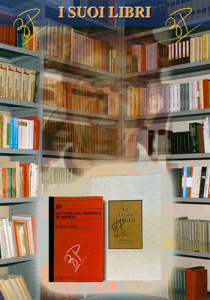HIS METHOD

The three thousand volumes scattered in the house of Don Puglisi today, a part of his library has been transferred to the Seminary of Palermo, to the vocation center or given … on “permanent loan” to friends, attest to his solid theological formation. He particularly loved the works of Karl Rahner, one of the fathers of the Council, philosophical treatises, (especially on Personalism as written by the French philosopher Emmanuel Mounier) and pedagogical books.
Freud and Fromm but also Sartre and Maritain: Father Pino put at the service of his sensitivity the most acute reflections of existentialism and the most modern methods of psychoanalysis, logotherapy and group therapy (among his favorite authors also American Karl Rogers ).
He used these instruments tactfully, without flouting them, to sharpen his remarkable innate qualities relating easily and meaningfully with Others (what Rogers calls “empathy” in his writings).
In addition to hisbooks, dozens of cassettes with the recordings of his speeches or homilies, are a precious testimony: together they constitute an organic archive at the diocesan center for vocations.
the quotes used for these pages are drawn from this material.
Throughout his life, Don Puglisi was able to form with strong personal relationships, regardless of social class or the level of education.,
The first stage was to listen.
Without ever talking about religion or God, in the delicate moment of the approach he avoided giving immediate advice ormagical recipes.
He knew that to findthe right words, especially with the weaker ones, it was first necessary toshare bread and the wine with them.
In a world that is always in a hurry, where everyone is completely lost in his own affairs, Don Pino’s great ears were a safe harbor.
The journey of listening was long, tortuous, and could also last for years; sometimes it could not even go anywhere. Father Puglisi knew how to listen, he respected each person’s own time, inviting them examine their souls, so as to measure their strength before choosing a goal.
Regarding his style, Father Agostino Ziino – a Palermitan of the Don Divo Barsotti monastic community in Tuscany of–wrote an enlightening commemoration speech on the first anniversary of his death:
Ziino Said “He was not a great speaker, but a priest whose word was propitiously propelled with ease and slow expression. This was not out of awkwardness or embarrassment, but fromhis desire to communicate ideasthat were carefully meditated and well-aimed. Never hasty or superficial, nor a man of visible displays and expressions, he lived friendship as a gift to himself and to others He was always nearby when it would be pleasant or helpful for you to share a moment of Joy or pain.
No matter where you met him immersed in group pastoral activities or in personal dialogues or in preparing catechetical or prayer encounters, he always welcomed you as if you were a gift from God.
And he never sent you away in a hurry, it wasas if he were receiving something from you, even ift you only went to him for a brief greeting.
In his hands time expanded; But it would be better to say not in his hands but in his heart, Because only Love can expand the inner spaces of the heart to always know how to welcome others as he did.
Wherever it was and at any time of the day – I dare say night and day –he offered you that welcoming and reassuring smile, which was already in his gospel message of a grace he lived.
The secret of his style of giving to himself others could only be Charity chosen and assumed as a constant attitude, being faithful to that virtue, made everything deep in him simple and profound truly evangelical“.
When a spark ignited in the mind of a young person in Don Pino’s ministry, the Listening phase became the phase community life, the opening of dialogue with others.
Precious examples of these efforts, which drew from many of the psychological techniques used in group therapy, are the vocational camps that Father Puglisi organized throughout the eighties, before he became a parish priest in Brancaccio.
In an environment of complete freedom, with no need to wear “masks” around others, the young people who participated in the camps were led to discover the values of friendship, solidarity, fraternity, and of service— in a word of “living together” in the Christian sense.
To those who, after completing this journey, asked to advance one more step, Father Pino suggested to turn towards God’s choice:
each of us –Puglisi often said – feels within a particular inclination, a charisma.
A project that makes every man unique and unrepeatable. This “call” is the sign of the Holy Spirit in us. Only listening to this voice can make sense of our lives.



Leave a Reply
Want to join the discussion?Feel free to contribute!